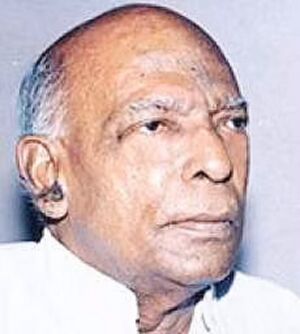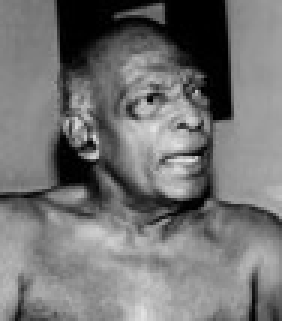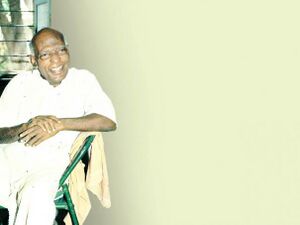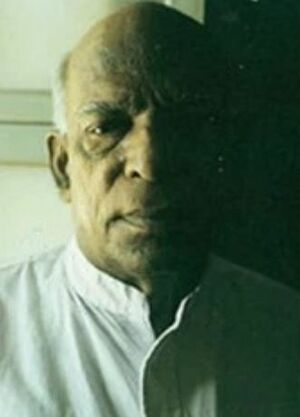Pa. Singaram: Difference between revisions
NVKalpakam (talk | contribs) No edit summary |
mNo edit summary |
||
| Line 27: | Line 27: | ||
* ''Puyalile Oru Thoni'' (1972) | * ''Puyalile Oru Thoni'' (1972) | ||
* ''Kadalikku Appal'' (1959) | * ''Kadalikku Appal'' (1959) | ||
=== | === References === | ||
*[https://www.bbc.com/tamil/arts-and-culture-53729790/ Life of Tamil people amidst the Second World War, As Documented in Pa. Singaram's novels - BBC News Tamil] | *[https://www.bbc.com/tamil/arts-and-culture-53729790/ Life of Tamil people amidst the Second World War, As Documented in Pa. Singaram's novels - BBC News Tamil] | ||
* [https://www.jeyamohan.in/161720/ A Request to Pa. Singaram' s Publishers | Writer Jeyamohan] | * [https://www.jeyamohan.in/161720/ A Request to Pa. Singaram' s Publishers | Writer Jeyamohan] | ||
| Line 33: | Line 33: | ||
*[https://www.hindutamil.in/news/literature/135813-.html| Difficulties faced by Pa. Singaram in publishing the novel Puyalile Oru Thoni, by C. Mohan] | *[https://www.hindutamil.in/news/literature/135813-.html| Difficulties faced by Pa. Singaram in publishing the novel Puyalile Oru Thoni, by C. Mohan] | ||
*[https://www.dinamani.com/junction/pazhuppu-nira-pakkangal/2016/sep/11/%E0%AE%AA-%E0%AE%9A%E0%AE%BF%E0%AE%99%E0%AF%8D%E0%AE%95%E0%AE%BE%E0%AE%B0%E0%AE%AE%E0%AF%8D-%E2%80%93-%E0%AE%AA%E0%AE%95%E0%AF%81%E0%AE%A4%E0%AE%BF-3-2562423.html| Excerpts from the novel Puyalile Oru Thoni, by Charu Nivedita] | *[https://www.dinamani.com/junction/pazhuppu-nira-pakkangal/2016/sep/11/%E0%AE%AA-%E0%AE%9A%E0%AE%BF%E0%AE%99%E0%AF%8D%E0%AE%95%E0%AE%BE%E0%AE%B0%E0%AE%AE%E0%AF%8D-%E2%80%93-%E0%AE%AA%E0%AE%95%E0%AF%81%E0%AE%A4%E0%AE%BF-3-2562423.html| Excerpts from the novel Puyalile Oru Thoni, by Charu Nivedita] | ||
=== | === Links === | ||
<references /> | <references /> | ||
[Category:English Content]] | |||
{{Ready for review-en}} | {{Ready for review-en}} | ||
Revision as of 19:54, 2 July 2022
இந்தப் பக்கத்தை தமிழில் வாசிக்க: ப.சிங்காரம்
Pa. Singaram (August 12, 1920 - December 30, 1997) is a Tamil novelist. He has written two popular novels in the backdrop of Tamil diaspora. Puyalile Oru Thoni, a forerunner in the non linear narration is one among them. This novel is considered to be a work of art in which the satire of high quality is depicted.
Birth, Education
Pa. Singaram was born on August 12, 1920 to K. Palanivel Nadar and Unnamulai Ammal at Singampunari, Sivagangai District as their third son. Subramaniyan and Baskaran were his siblings. His family was into garment business along with his grand father Kumarasamy Nadar. Pa. Singaram had his primary education at Singampunari Primary School and then completed his high school education at St. Mary's High School, Madurai.
Personal Life
After completing his high school education at Madurai, Pa. Singaram moved to Medan, Indonesia to work with his relative S. K. Chinnamuthu Pillai. He got married in Medan. When Pa. Singaram was 25 years old, his wife and child passed away during labour. After living in Malaya for 8 years (1938 - 1946), Pa. Singaram returned to India after the Second World War in the year 1946 and was living in Madurai thereafter. He was employed as a proof reader in the Madurai edition of Thina Thanthi daily and got retired in the year 1987 due to his poor health. Pa. Singaram was living alone in a rented room in the YMCA hostel, Madurai for 50 years. He stayed aloof and had not participated in any literary events. After YMCA management forcefully sent him out in the year 1996, he was living in another hotel room till his death.
Literary Contribution
Two Novels
Pa. Singaram got introduced to magazines like Manikodi and Kalaimagal when he was at school. His letters got published in these magazines. He started reading in English after he moved to Indonesia. Pa. Singaram's vision and style had the influence of American novelist Ernest Hemingway. After his return to India, he wrote two novels. The first novel Kadalukku Appal won a prize in Kalaimagal Novel Competition in the year 1959 and was published by Kalaimagal Karyalayam. The second novel Puyalile Oru Thoni that remained as a manuscript for long was published by Kalaignan Pathipagam in the year 1972. Both the novels were not noticed by literary critics when they got published. Apart from these two novels, Pa. Singaram is said to have written essays and short stories that remained only as manuscripts.
Comeback
Due to the difficulties in publishing the novels and the lack of literary attention, Pa. Singaram did not continue his writings. Later he had resentment and discontent towards literature. Literary critic N. Murugesa Pandian, who lived in Madurai, published an interview that he had with Pa. Singaram. Only a few writers like Ki. Rajanarayanan and Thanjai Prakash liked Pa. Singaram's writings. Ki. Rajanarayanan had written a letter to Pa. Singaram. N. Murugesa Pandian mentions that Thanjai Prakash had met Pa. Singaram in person.
In the year 1987, critic C. Mohan wrote an article about Tamil novels in the pro Tamil Eelam journal Pudhuyugam Pirakkiradhu. He had rated Puyalile Oru Thoni as one of the three best novels of Tamil. This sparked a discussion and drew the attention towards Puyalile Oru Thoni again.
Tamizhini publisher and the editor of Pudhuyugam Pirakkiradhu, Mr. Vasanthakumar had a high reputation on Pa. Singaram. Tamizhini brought out a beautiful edition of both the novels of Pa. Singaram in a single book in the year 1998. While the publishing was underway, Pa. Singaram passed away in the year 1997. Tamizhini published the book with a long critical essay Varalatru Abathathin Dharisanam (A perspective on the absurdity of history) by writer Jeyamohan. It was the first critical essay on Pa. Singaram and refuted the earlier criticisms on his novels. Writer Jeyamohan had argued that the modern literary critics Ka. Naa. Subramanyam and Sundara Ramaswamy denied the novel as it was lacking the perfection in form, but it is the non linear narrative and the polyphony of voices that provide the aesthetic appeal to the novel and helps it to transcend the modernity.
The subsequent readings of the novel provided the acceptance to Pa. Singaram and Puyalile Oru Thoni is considered as a great achievement in the Tamil lliterary milieu for noverls.
Death
Pa. Singaram passed away on December 30, 1997. He donated his savings of Seven and a half lakhs rupees to Nadar Mahajana Sangam towards the education of students. Also he had requested not to disclose his death to anyone.
Literary Significance
Pa. Singaram is regarded as the pioneer in writing high quality satire and the writer who has accomplished the non linear narrative style successfully in the novel Puyalile Oru Thoni. Jeyamohan mentions that (Varalatru Abathathin Dharisanam [1]) 'The occasions in which the diverse comprehensive nature of the language narrated in Tamil fictions were so far identified in the creative works of Pudhumaipithan, Mouni, La. Sa. Ra., Ashokamitran and Sundara Ramaswamy. There are occassions in Pa. Singaram's creative works in which the narration resonates or rises above the aforementioned ones in an angle'. Literary critic C. Mohan mentions that 'the creative language of Puyalile Oru Thoni finds a special place in the modern Tamil narration. No author in Tamil could subjugate the inner monologues of the characters like him. The spontaneity of memories is narrated in a facile style'.
Books
- Puyalile Oru Thoni (1972)
- Kadalikku Appal (1959)
References
- Life of Tamil people amidst the Second World War, As Documented in Pa. Singaram's novels - BBC News Tamil
- A Request to Pa. Singaram' s Publishers | Writer Jeyamohan
- Polyphony of Voices in Pa. Singaram's Novels | Kanali
- Difficulties faced by Pa. Singaram in publishing the novel Puyalile Oru Thoni, by C. Mohan
- Excerpts from the novel Puyalile Oru Thoni, by Charu Nivedita
Links
[Category:English Content]]
Ready for review en
Please do not write any content below this line. This section is only for editing templates & categories.




